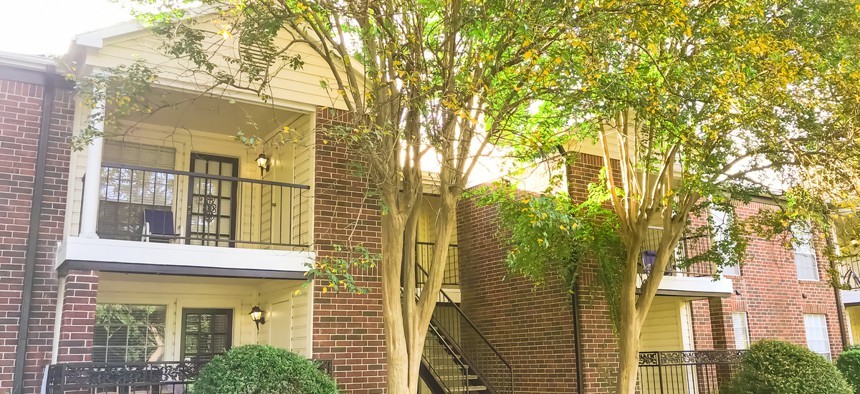Texas Allows Evictions to Proceed Again

An apartment complex in Dallas. Shutterstock
The state, which like others is experiencing historic levels of unemployment, is one of the earliest to restart eviction proceedings.
Even though not all business activities have resumed in Texas, the state’s court system will press forward this week with eviction cases, which were put on hold during the pandemic. The Texas Supreme Court last week ordered that eviction hearings can begin on Tuesday and eviction proceedings can commence next week, on May 26.
Texas, like many states, paused eviction proceedings in an effort to prevent renters who had lost their jobs or had their hours reduced from becoming homeless. Other states with eviction moratoriums that were set to expire in the past week have pushed the dates into June and July. New York’s moratorium, which was set to expire in June, has already been extended into August. On the other hand, some states, like Georgia and Louisiana, never put a statewide eviction moratorium in place.
More Americans were able to pay rent in the beginning of May than during the same timeframe in April, but experts caution against using the month-over-month upward trajectory as a sign that things will get better. Some tenants are working out payment plans with landlords and using credit cards, unemployment benefits, and savings to pay rent, a system that may not prove sustainable for much longer.
Courts will reopen for eviction proceedings in Texas as the state’s total coronavirus-related unemployment claims hit 1.9 million. Though some businesses have reopened since April 30 when Gov. Greg Abbott allowed the state’s stay-at-home order to expire, those 1.9 million people have not rushed back to work. Only some businesses have been granted the green light to reopen with new restrictions on occupancy and disinfecting procedures, though more will be allowed to take steps towards reopening in the following weeks.
Not all Texans who can’t make rent have to worry about eviction, though. Cities like Austin, San Marcos, and Dallas have all established some version of a ban on evictions, whether the practice is put on hold until a set date or tenants are allowed 90 days to make up unpaid rent before an eviction proceeding can begin.
Protections have also been extended for those in housing backed or owned by the federal government. The U.S. Department of Housing and Urban Development placed a moratorium on evictions for nonpayment of rent for those in government assisted housing until July 24, and the federal government is preventing landlords of properties with federally-backed mortgages from proceeding with evictions until August 23.
For weeks, lawmakers in many states have sounded the alarm over a potential wave of evictions that could arrive after moratoriums are lifted and tenants who have not yet returned to work face paying back months of unpaid rent.
In response, some cities are offering emergency financial assistance to help renters pay their bills, though many of these funds were quickly drained in March and April and have not been replenished. In Houston, a $15 million fund was depleted in less than 90 minutes. Mayor Sylvester Turner said last week that the city would need $150 to $200 million in federal help to build the program big enough “to make a meaningful difference in the lives of people in the city.”
At least one state—New Jersey—is allowing tenants to pay their rent using their security deposit and another—Connecticut—has implemented a 60-day grace period after rent is due for tenants who have lost their jobs or been furloughed.
Similar measures to the one in Connecticut have been proposed in some Texas cities, but have seen mixed success.
The Austin City Council approved a 60-day grace period last month, a bill brought forward by Council Member Greg Casar. “No one should lose their home during the pandemic,” he said at the bill’s hearing. “It’s wrong and it’s also terrible for public health.”
But Council Member Ann Kitchen noted that some people in the city “depend upon the rent they receive as landlords for one property or two properties” as their sole source of income. A member of the public testified that the policy was merely delaying an inevitable “eviction crisis” later on.
An identical bill failed this month when it was proposed in San Antonio, despite support from numerous renters advocacy organizations. The Texas Organizing Project expressed disappointment with the decision in a statement. “Our city leaders didn’t just kick the can down the road, they delivered the kick directly at the people who are already down,” said Michael Roberts, one of the group’s leaders. “People need time to recover once this pandemic is over. We can’t even begin to imagine what happens when people who haven’t worked in months and haven’t been able to pay rent start getting evicted. The pain and suffering will be great.”
Emma Coleman is the assistant editor at Route Fifty.
NEXT STORY: Two Coasts. One Virus. How New York Suffered Nearly 10 Times the Number of Deaths as California.






